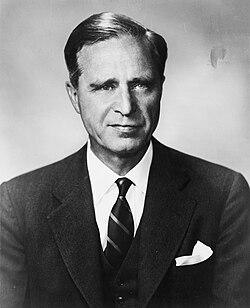| |||||||||||||||||
| |||||||||||||||||
Bush: 40-50% 50-60% 60-70% 70-80% 80-90% Dodd: 40–50% 50–60% 60-70% | |||||||||||||||||
| |||||||||||||||||
| Elections in Connecticut |
|---|
 |
The 1956 United States Senate election in Connecticut was held on November 6, 1956.
Contents
- Democratic nomination
- Candidates
- Convention
- General election
- Candidates 2
- Results
- See also
- References
Incumbent Senator Prescott Bush, who won a special election in 1952, was re-elected to a full term in office over Democratic U.S. Representative Thomas J. Dodd. Dodd would later be elected to the state's other Senate seat in 1958. As of 2025, this is the last time that a Republican has been elected to Connecticut's Class 3 Senate seat.



